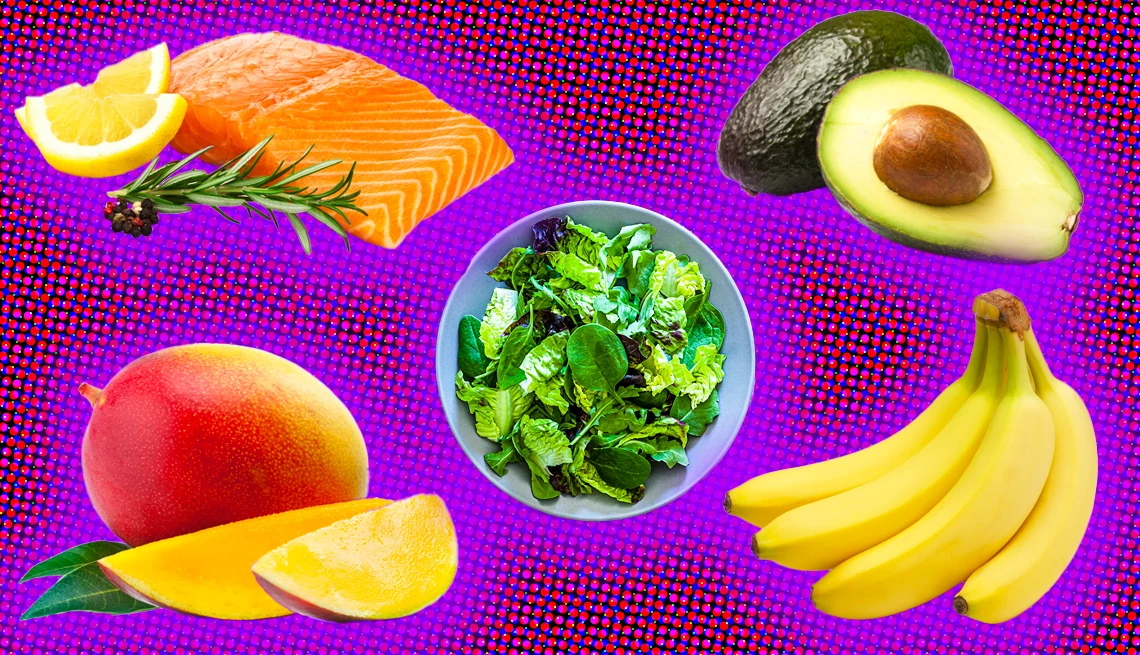AARP Hearing Center


Key takeaways:
- Eating a heart healthy diet may be good for your hearing.
- A healthy diet is associated with a lower risk of hearing loss.
- Hearing aids and a healthy foods may reduce your risk of dementia.
- Get most nutrients from foods rather than from supplements.
- See the foods and vitamins that may be good for your hearing.
While there’s no evidence that what you eat can reverse hearing loss, studies show that eating a healthy diet may help delay or slow the progression of hearing decline.
Take the connection between cardiovascular disease and your hearing, for instance. “The association of age-related hearing loss with heart disease has been well-documented,” says endocrinologist Robert H. Eckel, M.D., emeritus professor of medicine at the University of Colorado Anschutz Medical Campus.
Hearing loss and cardiovascular disease
Normal hearing relies on good circulation of oxygen-rich blood. The sensitive hair cells in your inner ear convert sound waves into electrical impulses that your brain interprets as sound. Poor blood circulation or inadequate oxygen damages these sensitive cells, Eckel says. “To reduce the risk of heart disease, it’s important to eat a diet rich in fruits, vegetables and whole grains, lean poultry and fish,” Eckel says.
Hearing loss and brain health
Free Hearing Test
AARP members can take the National Hearing Test online or on their phones — for free. This 10-minute test can help you decide whether you need a more comprehensive hearing exam.
Experts at The Lancet Commission on dementia consider hearing loss the single biggest modifiable risk for dementia. But less than a third of people 71 and older with hearing loss use hearing aids. Untreated hearing loss is linked to a decline in the ability to think, remember and learn. The Lancet Commission revised its 2020 findings in 2024 and now also includes high LDL cholesterol as another risk factor for dementia. So what you eat affects for brain health, too.
Hearing loss and what you eat
There’s more evidence that eating a healthy diet could be a factor in lowering your risk of hearing loss. Hearing loss is often thought to be unavoidable as we age, says Sharon Curhan, director of CHEARS, the Conservation of Hearing Study at Brigham and Women’s Hospital in Boston. The CHEARS research team monitored the hearing and diets of more than 70,000 women for 22 years and published a paper on the study in the Journal of Nutrition. “We found that an overall healthier diet, including eating two or more servings of fish each week, was associated with a reduced risk of hearing loss,” Curhan says.
Foods vs. supplements
The study found that women who stuck to diets like the Alternate Healthy Eating Index 2010, Dietary Approaches to Stop Hypertension (DASH) and Alternate Mediterranean diet (AMED) lowered their chances of hearing loss by at least 30 percent, compared to women with the lowest diet adherence. Those diets prioritize fruits and vegetables, as well as vitamins and minerals like folate, potassium and zinc. A separate study by the CHEARS team found that more isn’t always better.
“We were surprised to find that taking very high doses of vitamin C supplements was associated with an increased risk of hearing loss,” she says. Instead of heavily relying on nutritional supplements, the research suggests eating more nutrient-dense foods rich in vitamins and minerals, as well as fiber and omega-3 fatty acids, which help the cells in your body function as they should. “As the nutritional supplement market is underregulated, patients should speak directly with their physicians before taking dietary supplements aimed to supposedly improve hearing, as they may cause potential unwanted side effects, as well,” says Elliott Kozin, M.D., an otologist (ear, nose and throat physician) at Massachusetts Eye and Ear and assistant professor of otolaryngology at Harvard Medical School.




































































Next in series
Can Cochlear Implants Improve My Hearing?
Hearing aids aren’t the only way to better hearing. Cochlear implants might help too